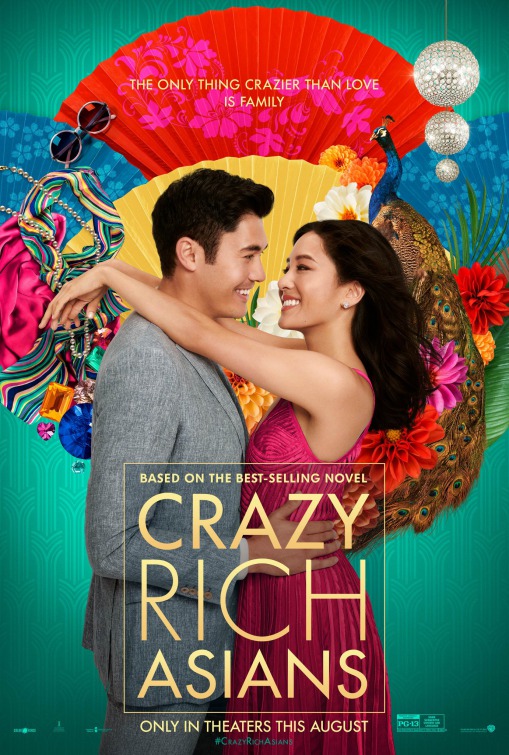The Only Thing Crazier Than Love Is Family
Director
Jon M Chu
Starring
Constance Wu
Henry Golding
Michelle Yeoh
Awkwafina
Gemma Chan
NYU economics professor Rachel Chu [Wu] is invited to Singapore for her boyfriend, Nick Young’s [Golding] sister’s wedding. This of course means meeting all the family members that Nick and as an only child with the single living parent the prospect is daunting. Things, however, seem awry at the airport as Rachel is put in first class and she learns that Nick’s family are affluent. Upon arrival in Singapore, Rachel meets up with her old college friend, Goh Peik Lin [Awkwafina] but when Peik Lin finds out who Nick actually is, she explains that Nick’s family aren’t just rich but that they are one of the wealthiest families in all of China, creating more anxiety about meeting Nick’s mother, Eleanor Young [Yeoh].
At its core, Crazy Rich Asians is a wonderful throwback to classic romantic films featuring prominent traits that have felt long absent from cinema, replaced with cynicism and grotesquery. I, of course, am not opposed to cynicism and grotesquery but after a while, it’s good to have an enjoyable escapist fantasy with some genuine heart to it. Combining themes of tradition vs modernity and power vs peasant with love at its centre, there’s something incredibly familiar about this story. On top of the strangely nostalgic formula of the story itself, the whole thing is presented magnificently. The set design and costume work are amazing, giving us a nice dichotomy between contemporary life in America over the luxurious dynastical world of the old-world families of Singapore. Equally, the music is extremely well crafted and assembled, in terms of the original score and the selected soundtrack, instilling another unique twist on a familiar vibe.
The characters presented represent the standard archetypal big family with their own set of dramas and personalities, all of which are explained decently yet waver a bit with their conclusions (but more on that later). At the centre are Constance Wu and Henry Golding who not only have fantastic chemistry but helm this whole feature brilliantly. It may not sound like much but if you can’t root for the lead couple, the film would literally die on its feet. Then we have Eleanor in what could be described as a fairly generic in-law adversarial role but the layering and complexity to her character is both well-written and masterfully performed. On top of that there is a whole host of captivating and memorable standout performances that I could easily list but I’d probably miss someone and the praise would make for tedious reading eventually. One thing I really appreciated though was the representation of first generation children of immigrants who are labelled as Chinese by Americans and dismissed only as American in Singapore. Cinema has always had a bit of a fixation with representing block areas as one people and that includes those who look a certain way but do not necessarily have that many ties to their ethnicity. Thankfully there is a growing trend to highlight the differences between (for example) Asians, Eurasians and American-Asians and even then, subdividing that into the specific regions of origin and habitation. Clumsily worded, I know but hopefully you see what I’m getting at.
With all that being said, it would be a hideous double-standard to say this film is without fault. As with all major romantic comedies there are plot threads that seemingly go nowhere, underdeveloped characters and a resolution that, while upbeat and pleasing, alters very little about the obstacles in the relationship’s way. Without spoiling things in the dissection process, Astrid’s character (played by Gemma Chan) is an extremely good example of this; on the surface her storyline is handled very well but in trying to sum things up quickly, they wrap everything up a little neatly, specifically her final shot at the bar. I get the idea behind it but it feels like an afterthought, as if people wouldn’t be happy with the reality of the situation, so we are given a fake upbeat finale – which is true of a lot of individuals reacting at that party. But I also appreciate that’s the nature of two-facedness and a part of the political game that has been played throughout. Also, something that is both a positive and a negative is the interchangeability of the story. The interesting truth of cultural differences it that most of them are relatable to most audience members. That’s not to say the specificities and eccentricities aren’t worth exploring but the bulk of the material largely remains the same; like the same base of a cake coated in different icing. A film about a big Italian wedding with an overbearing matriarch is something that can be appreciated in India, China, America, etc. and while that’s something that this film defiantly explains to the cinematic gatekeepers, it also means that there isn’t a great deal of new ground being trodden outside of the culture in central focus. But that, in truth, is the only real flaw of this movie, it’s a bit formulaic and generic but the progressive nature, completely enjoyable charming dynamics and weight of significance and importance for representation massively compensates for any shortcomings.
Release Date:
14th September 2018
The Scene To Look Out For:
As we are first introduced to Eleanor and her two young children, she checks in to an expensive London hotel only to be treated poorly and with disdain by the racist members of staff. Despite having a reservation, Eleanor is turned away into the stormy night, refused even a phone call. She then returns having explained the situation to her husband who has acquired the hotel from the family friend who owns it and is escorted to her suite. This performs three things in an exceptionally clever manner. First, we learn about Eleanor’s relationship with her husband (who is never really seen throughout the film) and her sense of will and determination. It also instils in the audience a sense of satisfaction making Eleanor a hero before recasting her as a villain, which is a nice rug-pull. And finally, it says to an audience who could never dream of the kind of money or privilege that these people have, that she has been dealt a band hand more than once and we should feel sorry for her. Which, in an age where people are living on reduced salaries, is quite the feat.
Notable Characters:
**Arguable spoilers within**
Nick’s grandmother, Shang Su Yi [Lisa Lu], is fascinating, a real embodiment of the outwardly successful and ideal image while being something completely different when against the wall. From her introduction, we immediately assume she will be an ally to Rachel but she turns out to be one of the least understanding individuals and this subversion of expectations is one of the fresher aspects that really saved this film from being predictable and disappearing into the crowd.
Highlighted Quote:
“I can’t believe this airport has a butterfly garden and a movie theatre. JFK is just salmonella and despair”
In A Few Words:
“Far from perfect with loose threads throughout but an altogether thoroughly enjoyable and uplifting romantic comedy that feels quintessentially both conventional and progressive”
Total Score: 4/5
![The Red Right Hand Movie Reviews [Matthew Stogdon]](https://reviews.theredrighthand.co.uk/wp-content/uploads/2021/12/cropped-header1.png)




